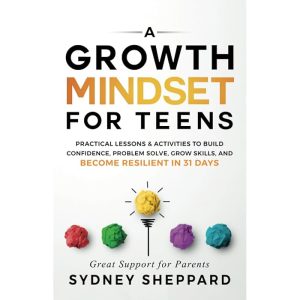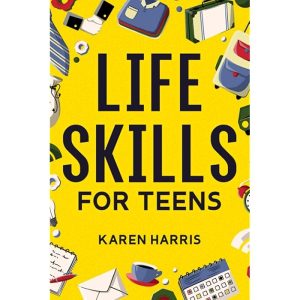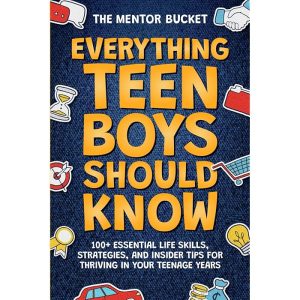Description
“Everything You Need to Know Before You’re 16 (But Won’t Get Taught in School)” is a concept that touches on the life skills, mindset shifts, and practical knowledge that aren’t typically covered in traditional educational curricula but are essential for personal growth, success, and happiness. While school focuses on academics like math, science, history, and literature, there are countless other lessons and skills that can be just as, if not more, important for navigating life. Here’s a list of key concepts that fall into this category:
### 1. **Emotional Intelligence (EQ)**
– **What it is:** The ability to understand, manage, and express your emotions, as well as recognize and influence the emotions of others.
– **Why it matters:** High EQ helps in building relationships, making sound decisions, managing stress, and resolving conflicts. It’s crucial for success in both personal and professional life.
– **What you can do:** Practice self-awareness, self-regulation, empathy, and active listening.
### 2. **Growth Mindset**
– **What it is:** The belief that abilities and intelligence can be developed with effort, practice, and learning.
– **Why it matters:** A growth mindset fosters resilience and perseverance. It allows you to see failures as opportunities to learn, rather than as permanent setbacks.
– **What you can do:** Embrace challenges, keep learning, and reframe failures as learning experiences.
### 3. **Financial Literacy**
– **What it is:** Understanding the basics of money management, such as budgeting, saving, investing, and avoiding debt.
– **Why it matters:** Financial skills are essential for making informed decisions about how to manage money, set goals, and build wealth.
– **What you can do:** Learn about budgeting, saving, credit, interest rates, and how to make money work for you.
### 4. **Time Management and Prioritization**
– **What it is:** The ability to organize your time effectively so that you can balance school, work, relationships, and self-care.
– **Why it matters:** Learning to manage time efficiently can reduce stress, improve productivity, and help you achieve your goals.
– **What you can do:** Set clear priorities, use tools like calendars or planners, and break tasks into smaller, manageable steps.
### 5. **Self-Care and Mental Health**
– **What it is:** Taking care of your body, mind, and emotions, and understanding the importance of mental health.
– **Why it matters:** Maintaining mental and physical health is essential for happiness, productivity, and overall well-being.
– **What you can do:** Develop healthy habits, practice mindfulness, get enough sleep, and know when to ask for help.
### 6. **Effective Communication Skills**
– **What it is:** Being able to express yourself clearly and listen effectively to others.
– **Why it matters:** Good communication is essential in personal relationships, teamwork, and professional success.
– **What you can do:** Practice speaking clearly, listening actively, and being mindful of nonverbal cues like body language.
### 7. **Resilience and Coping with Adversity**
– **What it is:** The ability to bounce back from challenges and setbacks and maintain a positive outlook.
– **Why it matters:** Life will inevitably present challenges; resilience helps you overcome them and grow stronger.
– **What you can do:** Cultivate problem-solving skills, maintain a positive attitude, and seek support when needed.
### 8. **Building Healthy Relationships**
– **What it is:** Understanding how to form and maintain healthy, respectful, and supportive relationships with family, friends, and romantic partners.
– **Why it matters:** Positive relationships contribute significantly to mental and emotional well-being.
– **What you can do:** Communicate openly, set boundaries, and practice empathy and respect.
### 9. **Setting Goals and Self-Discipline**
– **What it is:** The ability to set clear, achievable goals and the self-discipline to stay focused and work toward them.
– **Why it matters:** Goal setting is a powerful tool for personal growth and achievement, while self-discipline keeps you on track even when motivation wanes.
– **What you can do:** Break down big goals into smaller steps, stay organized, and hold yourself accountable.
### 10. **Decision-Making and Critical Thinking**
– **What it is:** The ability to evaluate information, weigh options, and make choices based on logic and reasoning rather than emotion or impulse.
– **Why it matters:** Good decision-making skills are vital for success in every area of life.
– **What you can do:** Practice analyzing situations, considering pros and cons, and thinking long-term.
### 11. **Understanding and Embracing Failure**
– **What it is:** Learning that failure is not something to be feared, but a natural part of the process of growth and success.
– **Why it matters:** When you embrace failure, you can learn valuable lessons and develop resilience.
– **What you can do:** Reflect on what went wrong, what can be learned, and how you can improve next time.
### 12. **Basic Cooking and Nutrition**
– **What it is:** Understanding how to prepare simple, healthy meals and the importance of balanced nutrition.
– **Why it matters:** Knowing how to cook and make healthy food choices is essential for maintaining physical and mental health.
– **What you can do:** Learn basic recipes, understand nutrition labels, and experiment with cooking at home.
### 13. **Critical Media Literacy**
– **What it is:** The ability to analyze and evaluate the information presented in the media, including understanding biases, misinformation, and propaganda.
– **Why it matters:** In today’s world, it’s easy to be overwhelmed by information. Learning how to discern fact from fiction is crucial.
– **What you can do:** Question sources, cross-check facts, and be aware of your own biases when consuming media.
### 14. **Networking and Building Connections**
– **What it is:** Developing meaningful connections with people that can support, advise, and inspire you.
– **Why it matters:** Relationships are often key to finding opportunities, whether in education, careers, or personal growth.
– **What you can do:** Be proactive, attend events, show interest in others, and maintain genuine relationships.
### 15. **Understanding Diversity and Inclusion**
– **What it is:** The importance of respecting and valuing differences in people based on culture, ethnicity, gender, sexuality, and other factors.
– **Why it matters:** Embracing diversity and inclusion helps create more equitable societies and richer personal relationships.
– **What you can do:** Educate yourself about different cultures and experiences, be open-minded, and practice inclusivity.
### 16. **Taking Responsibility for Your Actions**
– **What it is:** Acknowledging when you make mistakes, learning from them, and taking steps to make things right.
– **Why it matters:** Taking responsibility helps you build trust with others and take control of your own life.
– **What you can do:** Own up to mistakes, apologize when necessary, and make amends where possible.
### 17. **How to Handle Peer Pressure**
– **What it is:** Learning how to say no and maintain your own values and boundaries when others try to influence you.
– **Why it matters:** Being able to stand your ground is crucial for your self-esteem and mental health.
– **What you can do:** Build confidence in your own beliefs, practice assertiveness, and surround yourself with supportive people.
### 18. **Saying “No” and Setting Boundaries**
– **What it is:** Knowing when and how to assert your limits in relationships, work, and personal time.
– **Why it matters:** Boundaries help protect your time, energy, and mental health, and prevent burnout.
– **What you can do:** Practice assertiveness and be comfortable with saying “no” when necessary.
—
### Final Thoughts






Reviews
There are no reviews yet.